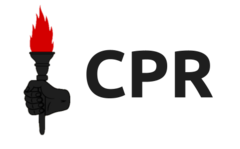Revolutionary People's Council (Elparia)
This article is incomplete because it is pending further input from participants, or it is a work-in-progress by one author. Please comment on this article's talk page to share your input, comments and questions. Note: To contribute to this article, you may need to seek help from the author(s) of this page. |
Revolutionary People's Council Council de Peoples Revolutionary | |
|---|---|
 | |
| Abbreviation | CPR |
| Presidium | Barrington Mendez, Adra Mendez, Dauton Lopez, Carter Joseph, Nathaniel Escobar |
| Spokesperson | Ibino Carerras |
| First Director | Barrington Mendez |
| Secretariat | Edmundo Castillo, Samuel Zanhuesa, Ramon Galvez |
| Founded | April 7, 1960 |
| Headquarters | Spira, Jaragua |
| Student wing | National Student Organization |
| Youth wing | Young Revolutionaries |
| Paramilitary wing | Volunteer Force |
| Think tank | Order of the Empyrean |
| Mothers' wing | Jaraguan Mothers' Organization |
| Ideology | Christian nationalism Militarism Statism Cybernetics Populism |
| Political position | Syncretic |
| Colours | Red, Blue |
| National Directorate | 98 / 98 (100%)
|
| Website | |
| cpr.ja | |
The Revolutionary People's Council is the sole ruling party of Jaragua. The party governs the country as an autocracy under the First Director. No other political groups can organize. Its paramilitary wing is the Volunteer Force and its armed wing is the Revolutionary Army, which serves also as the country's military. The party's membership is made up of mostly Oriental Orthodox, while also having many Protestant and Catholic members. The party is not open to any other religion. Despite its populist rhetoric, the party has been described by critics as a Christian esoteric cult.
The Revolutionary People's Council was founded on 7 April 1960 by Michael Mendez, Joseph Benson, and eight other members in response to what it called "abuses against Jaraguan peasants" and the spread of vodou. Michael Mendez ran in the 1961 and 1966 elections on the RPC's ticket, pledging to ban vodou should he be elected. He earned 28% of the vote and 44% of the vote in each election respectively. Over the years, the party gained a lot of popularity among conservative factions, churchgoers, and former socialists who had been purged from the secular communist parties for being too religious. While not being nominally socialist, the party advocated for the nationalization of industries and the seizure of land from plantation owners. Following the 1966 coup d'etat, the party went underground and began organizing a revolution in secret. The military government attempted to keep tabs on the party, however, was unable to accurately determine much about it. Hundreds of members of the military had secretly been a part of the Revolutionary People's Council and participated in the 1970 overthrow of General Smith, who fled for Olympia during the December Revolution.